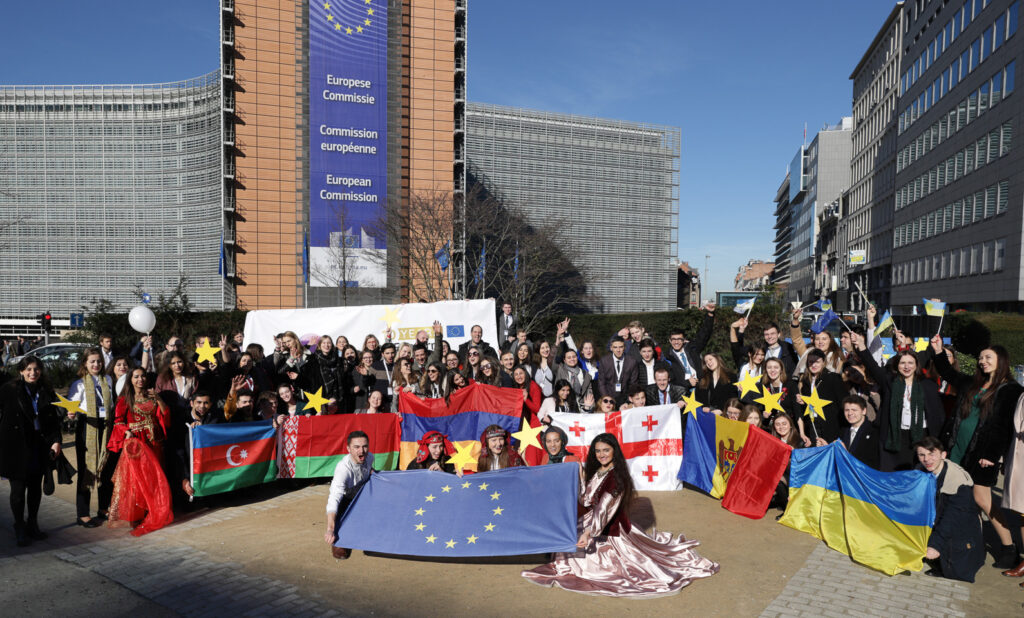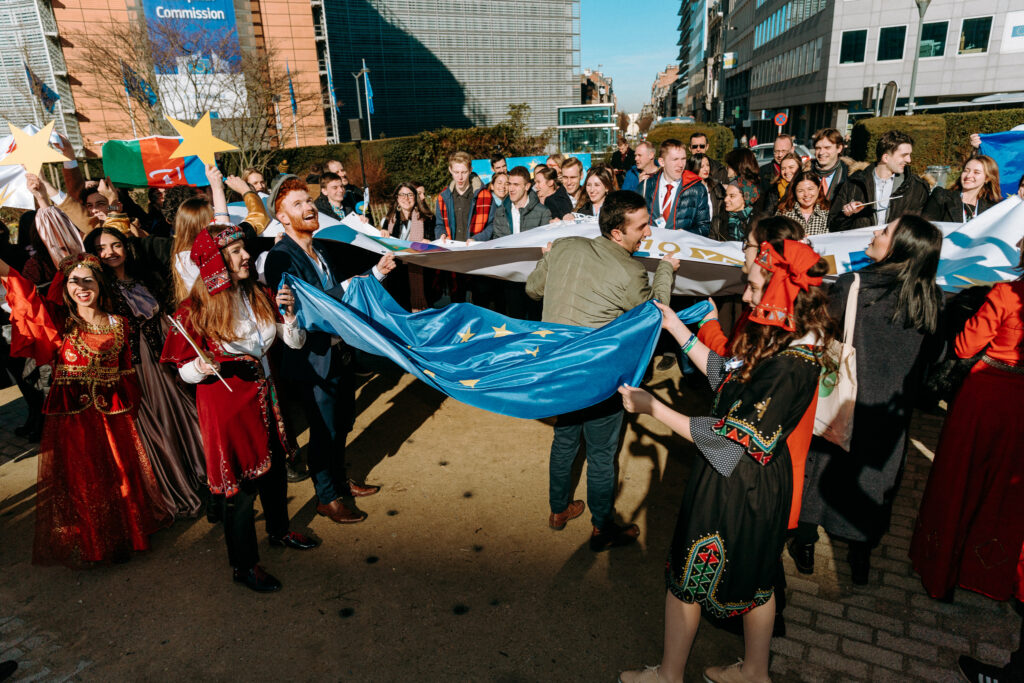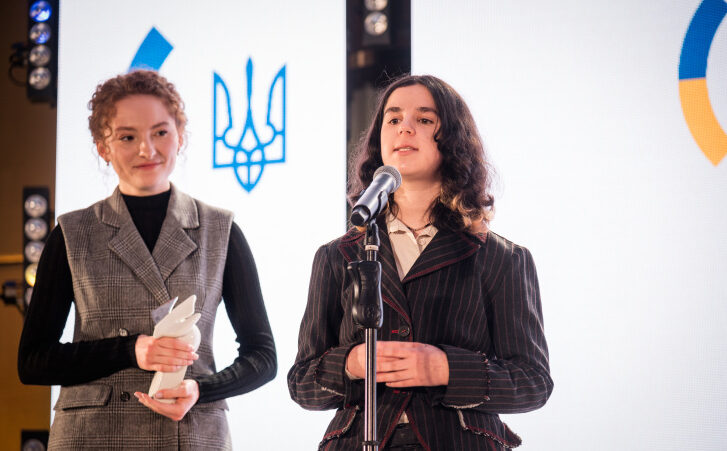
Stronger together for a stronger society – Reflections on the Eastern Partnership’s 10th Anniversary
‘Stronger society’ is one of the 4 key themes of the EU’s Eastern Partnership (EaP). At first this concept could mean any number of things, but for the two of us stronger society means people – especially the youth – having an opportunity to obtain education, information and valuable skills which can be realised, harnessed and put to use through meaningful employment or voluntary work. With enough motivation, people who are empowered and equipped with these opportunities have a real chance to influence and contribute to the social, economic, cultural and political life of their countries and communities.
As we celebrate 10 years of the EaP, we look at how the EU has helped realise and promote ‘stronger societies’ in our countries since the Eastern Partnership was established back in 2009.
In these 10 years thousands of young people from Georgia and Armenia have gone abroad through the Erasmus+ program, both from the universities and through non-governmental organisations (NGOs). Esma, a Young European Ambassador from Georgia, even transferred from one university to another in order to participate in Erasmus+. Andranik, also a Young European Ambassador, is an Erasmus+ alumnus from Armenia who had his Erasmus experience at the University of Bologna in Italy. Erasmus surely changed our lives. Besides learning the culture we gained a deeper knowledge of the European Union, European countries and Europe as an institution. But, of course, during our free time we also traveled, socialised and made friends for life which was equally as important in shaping our Erasmus experience.
 Celebration to honour the EaP 10th Anniversary
Celebration to honour the EaP 10th Anniversary
Erasmus is about more than simply going abroad to study. It is also about widening your view of the world, meeting different people from different cultures, falling in love with places you never knew before. It is about making dreams come true.
Through these kinds of programs and experiences the EU has been supporting civil society in the region throughout years to gain trust and attract more young people. With more experience, and financial and technical support we have become more motivated to volunteer for NGOs. Many of us have gone on to volunteer through the European Voluntary Service (now being replaced by the European Solidarity Corps) and kept on volunteering even after returning home. More than a half of the Young European Ambassadors from Georgia and Armenia have participated in an academic or a short-term Erasmus+ exchange program or EVS. Many have participated in these programs more than once. You can also read Ashot Tadevosyan’s story, one of the Armenian YEAs who is currently doing his EVS service in Croatia.
The ‘Young European Ambassadors’ initiative is voluntary as well. All of these programs we’ve mentioned work on a “give and receive” model: a pattern of interdependency and mutual benefit pattern which encompass exactly what ‘stronger society’ is capable of achieving. Young people who have benefited from these exchange programs are eager to contribute and pass their experience, skills and knowledge they have gained during their exchange period on to others.
Through its different grant schemes the European Union fosters professional work and coordination of organisations dedicated to youth, human rights and rule of law which employ many passionate and educated young people who are often the authors and initiators of various development- and progress-oriented project proposals. These funding opportunities don’t just help these proposed ideas to become reality, but they also give young people — some of whom have previously been volunteers and exchange students through EU funded programs — opportunities to find relevant and fulfilling jobs in their countries. This is exactly the type of incentive and encouragement we need to get young people to be more civically active and engaged, and to feel more optimistic about their prospects; now and into the future.
For us, both Erasmus+ and the Young European Ambassadors initiatives proved to be beneficial; one in terms of creating educational and empowerment opportunities, and the other thanks to its sharing power and voluntary nature. Both of these benefits were actively discussed during the EaP 10th Anniversary Launch Event in Brussels this February by YEAs and the EU NEIGHBOURS east team. We also emphasised the importance of making Erasmus+ more accessible for vulnerable groups by removing some financial barriers that are still associated with participation.
We also discussed how the YEAs initiative could offer even more information and opportunities to participants and the community, including adding training on specific issues relevant to young people in the region beyond traditional presentations about the EU, its history, values and youth opportunities. Specifically, training on transferable skills such as Resume/CV writing, preparation of the motivation letters, and recommendations on how to act at an interview were suggested as skills which anybody would need, not only for participation in the EU-funded programs.
Even though investing in people might be challenging, in the long run it is the most rewarding one.
In these 10 years of the Eastern Partnership, the youth of our countries have been the key beneficiary of EU-funded programs. As two young people who have experienced these benefits we believe that, in the next 10 years, our societies will be better educated, more informed and have new skills to make us as strong as we can be. With enthusiasm and motivation to change the future, we believe in the idea that we are stronger together, and that working together will allow us to strengthen our societies.
 Celebration to honour the EaP 10th Anniversary
Celebration to honour the EaP 10th Anniversary
LATEST

Building Europe: Poland’s experience of joining the European Union and lessons for Ukraine

World Health Day 2024: My Health, My Right

EUREKA MEETS EUROPE – opportunities to develop and study. My experience

Can you wear pink in the workplace?

Go where your deepest fears lie: finding the courage to overcome gender barriers in STEM
More campaign pages:
Interested in the latest news and opportunities?
This website is managed by the EU-funded Regional Communication Programme for the Eastern Neighbourhood ('EU NEIGHBOURS east’), which complements and supports the communication of the Delegations of the European Union in the Eastern partner countries, and works under the guidance of the European Commission’s Directorate-General for Neighbourhood Policy and Enlargement Negotiations, and the European External Action Service. EU NEIGHBOURS east is implemented by a GOPA PACE-led consortium. It is part of the larger Neighbourhood Communication Programme (2020-2024) for the EU's Eastern and Southern Neighbourhood, which also includes 'EU NEIGHBOURS south’ project that runs the EU Neighbours portal.

The information on this site is subject to a Disclaimer and Protection of personal data. © European Union,